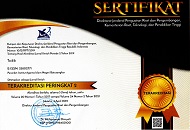Analysis of The Teacher'S Role in Learning Management in a Talent-Based Curriculum
Abstract
Keywords
Full Text:
PDFReferences
Asyhuri. (2017). Kurikulum Berbasis Talenta (Passion) di Pondok Pesantren Modern Islam (PPMI) Assalaam. Jurnal Ilmiah Pesantren, 1(1 Januari), Article 1 Januari. http://jurnal.assalaam.or.id/index.php/dfg/article/view/26
Bereiter, C., & Scardamalia, M. (2018). Intentional learning as a goal of instruction. In Knowing, learning, and instruction (pp. 361–392). Routledge.
Hanani, S., Putri, H. E., Roza, V., Arif, M., & Anas, F. (2019). BICED 2019: Proceedings of the 1st EAI Bukittinggi International Conference on Education, BICED 2019, 17-18 October, 2019, Bukititinggi, West Sumatera, Indonesia. European Alliance for Innovation.
Illahi, R. K. (2019). Upaya Sekolah dalam Mengidentifikasi Talenta Peserta Didik. Jurnal Al-Taujih: Bingkai Bimbingan Dan Konseling Islami, 5(2), 158–168.
Khan, A., Khan, S., Zia-Ul-Islam, S., & Khan, M. (2017). Communication Skills of a Teacher and Its Role in the Development of the Students’ Academic Success. Journal of Education and Practice, 8(1), 18–21.
Lawrence, J. E., & Tar, U. A. (2018). Factors that influence teachers’ adoption and integration of ICT in teaching/learning process. Educational Media International, 55(1), 79–105. https://doi.org/10.1080/09523987.2018.1439712
Lee, S. W. (2018). Pulling Back the Curtain: Revealing the Cumulative Importance of High-Performing, Highly Qualified Teachers on Students’ Educational Outcome. Educational Evaluation and Policy Analysis, 40(3), 359–381. https://doi.org/10.3102/0162373718769379
Mohamed, Z., Valcke, M., & De Wever, B. (2017). Are they ready to teach? Student teachers’ readiness for the job with reference to teacher competence frameworks. Journal of Education for Teaching, 43(2), 151–170. https://doi.org/10.1080/02607476.2016.1257509
Peters, S. J., Matthews, M. S., McBee, M. T., & McCoach, D. B. (2021). Beyond Gifted Education: Designing and Implementing Advanced Academic Programs. Routledge. https://doi.org/10.4324/9781003233299
Setiawan, B., & Suwandi, E. (2022). The Development of Indonesia National Curriculum and Its Changes: The Integrated Science Curriculum Development in Indonesia. Journal of Innovation in Educational and Cultural Research, 3(4), Article 4. https://doi.org/10.46843/jiecr.v3i4.211
Sukirman, S. (2020). TEORI, MODEL, DAN SISTEM PENDIDIKAN. Lembaga Penerbit Kampus.
Wati, L. A., & Asri, Z. (2021). Relevansi Pemikiran Pendidikan Mohammad Sjafei pada Pelaksanaan Pendidikan di INS Kayutanam (2006-2018). Jurnal Kronologi, 3(1), 156–163.
DOI: http://dx.doi.org/10.31958/jt.v25i2.6857
Refbacks
- There are currently no refbacks.
Copyright (c) 2022 Rilci Kurnia Illahi

This work is licensed under a Creative Commons Attribution-NonCommercial 4.0 International License.
TA'DIB with registered number e-ISSN: 2580-2771, p-ISSN: 1410-8208 have been indexed on:

Journal Ta'dib distribute under Lisensi Creative Commons Atribusi-NonKomersial 4.0 Internasional.
Contact us: Ta'dib; Address: FTIK, Universitas Islam Negeri Mahmud Yunus Batusangkar; Jl. Sudirman No. 137 Lima Kaum Batusangkar, Tanah Datar, Sumatera Barat, Indonesia. Email: takdib@uinmybatusangkar.ac.id

























